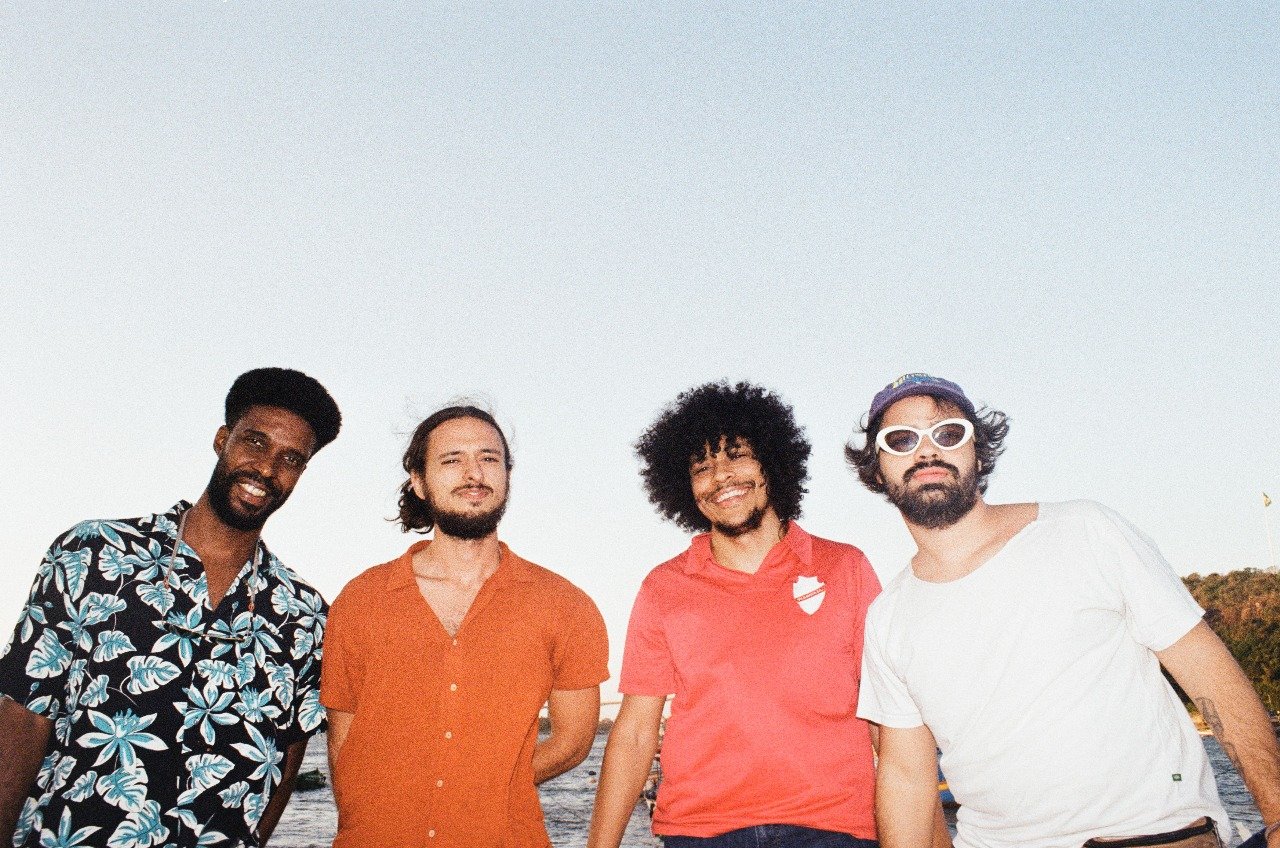Performing this Friday, the 18th, the band presents a homemade album guided by dreams. The work blends psychedelic melodies with country roots. The single gets a music video set in the 1970s.
Marcus Vinícius Beck
Having thrilled audiences around the world, the Goiânia-based band Boogarins returns to its starting point this Friday, the 18th, at 8 pm, at Martim Cererê, in a show marking the release of their album “Bacuri.” At Cererê, sun dust, wings, and musical reveries will reign.
Behold: an album. Their fifth studio album, to be exact. A playful album. Cohesive, let’s say. But still, a post-Tropicalália, post-Mutantes, post-Clube da Esquina album.
Shadow or doubt? Here, if you haven’t figured it out, neither. The thing is: “This sadness isn’t here to stay.” Have faith, now. “A smile comes without warning,” warns the lyrical self on the track “Chuva dos Olhos,” the third from “Bacuri,” now available on digital platforms.
Released last year, the new material avoids endless psychedelic improvisations. “It’s the first album we feel captures the energy of our live shows,” says guitarist Benke Ferraz, whose arrangements highlight his musicality.
“It’s funny that they always called us ‘boys,’ and now the ‘boys’ are different, our children,” says the artist, father of Rafa, 3. This time, the boys are his and guitarist Dinho Almeida’s son, José Lirio, 2. Fatherhood permeates the new repertoire, in fact.
Whether in memories of childhood in Goiânia or in the flow of existence, Boogarins returns to the past. That time when life seemed like a ball of yarn—it was slowly unraveling. Hence, the album presented in Goiânia took so long to come out. Why rush?
Originating in the Tupi-Guarani language, the word “Bacuri” denotes both the Amazonian fruit and childhood, which is revealed on the album cover. Created by Samuel Saboia, the design is inspired by childhood dreams. Like this childhood garden, the group pursued novelty.
This materializes in timbres, without, of course, abandoning the psychedelic melodies or Brazilian harmonies. Between 2022 and 2024, they toured performing the repertoire of the legendary Clube da Esquina. They have also shared the stage with the American band The Black Angels.
Thus, the ten tracks on “Bacuri” were born — Ynaiã Benthroldo, the drummer, makes his composition and vocal debut on this album. He sings on the title track, the one he wrote. It’s a mantra, a prologue, with musical dimensions ranging from bells to children’s laughter.
In a sense, the production was homemade—at least for an international band. Sound engineer Alejandra Luciani, bassist Raphael Vaz, and guitarist Dinho Almeida led the work at the house they shared in Barra Funda, São Paulo. The last time the artists had created in this style was 2013’s “As Plantas Curam.”
Formed that year, Boogarins exploded abroad by creating a consistent psychedelia. Musically, the band takes the listener on a dreamlike journey. The arrangements reverberate with a profusion of indie riffs, Ray Manzarek-style synthesizers, and economical—yet elegant—drums.
It recalls Arnaldo Baptista’s finest moments, as if music were the road that guides the listener to the unconscious. “To blow, to love. To sing without fear. My artifice. Better than suffocating,” intones the poetic voice of the song “Chrystian & Ralf (Only God Knows).”
This composition begins with a folk guitar—a nod to the group’s Goiás roots. Boogarins strived to create a blend of psychedelic rock and sertanejo music, whose atmosphere is embodied in the sounds of Benke Ferraz and Dinho Almeida’s guitars.
Vintage Aesthetic
Yesterday, the quartet released the music video for “Chrystian & Ralf (Só Deus sabe)” on YouTube. It features footage from an unfinished film, “Boulevard 70,” directed by Patrick Mendes and photographed by Larry Machado. The production is set in Goiânia in the 1970s.
Under the gaze of Mauricinho Hippie (Mar Dias Rosa), the work portrays a cultural scene in creative turmoil. With a vintage aesthetic, the colors evoke Super 8 film. Mendes and Machado chose psychedelic sertanejo music because of its connection to the capital of Goiás.
According to Patrick Mendes, the film is expected to be shown to the public in 2026. “It’s part of the post-pandemic revival of Goiás cinema, but it hasn’t been completed yet due to a lack of resources, highlighting the need for public policies and private initiatives,” he says.
Back home, Boogarins reunites with his sharp Martim Cererê—he’s already performed at Coachella, Lollapalooza, Primavera Sound, and Rock in Rio Lisboa. Tickets are on sale at BilheteriaDigital.com, starting at R$80. The first two batches have already sold out.
